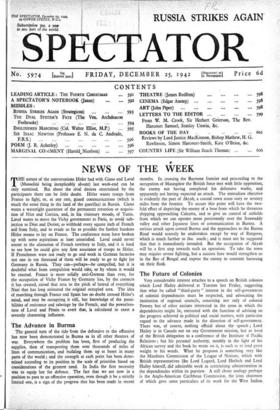The Future of Colonies
Very considerable interest attaches to a speech on British colonies which Lord Halley .delivered at Toronto last Friday, suggesting that what he called " third-party " interest in the self-government of colonial dependencies must be respected, and advocating the institution of regional councils, consisting not only of colonial Powers but of other nations interested in the areas in which the dependencies might lie, entrusted with the function of advising on the progress achieved in political and social matters, with particular regard to the advance made in the direction of self-government. There was, of course, nothing official about the speech ; Lord Hailey is in Canada not on any Government mission, but as head of the British delegation to a conference of the Institute of Pacific Relations ; but his personal authority, notably in the light of his African survey and the book he wrote on it, is such as to lend great weight to his words. What he proposes is something very like the Mandates Commission of the League of Nations, which with British representatives like Lord Lugard, Lord Harlech and Lord Halley himself, did admirable work in scrutinising administration in the dependencies within its purview. A still closer analogy perhaps is the Anglo-American Caribbean Commission, the joint chairmen of which gave some particulars of its work for the West Indian
islands in London last week. The new Colonial Secretary, Col. Oliver Stanley, said significantly on Monday that " he hoped to see in the colonial sphere the continuance of national sovereignty, but combined with the principle of international co-operation." This is a striking enunciation of policy, though it calls for further definition ; co-operation, for example, does not necessarily mean soliciting, much less acceptng, supervision. But it could perfectly well mean that, or even more. What it obviously does mean is the unreserved acceptance of the principle of trusteeship.



























 Previous page
Previous page